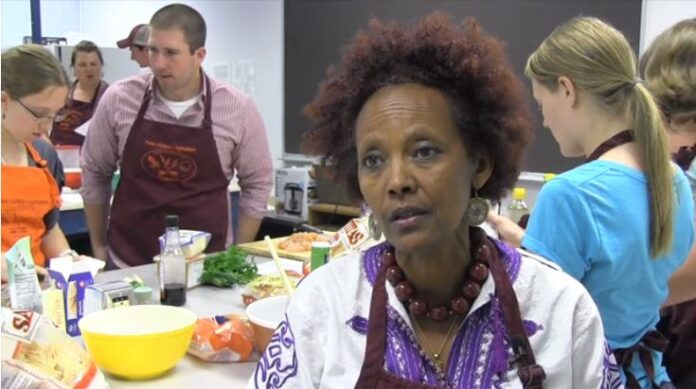
The producers of the “Next Food Network Star” would do well to look at Ozzie Abaye’s food lab for the next generation of talent shaping our culinary landscape. As part of her world crops and cropping systems class in the VT College of Agriculture and Life Sciences, her students prepare dishes based on the crops they study in class.
“This class connects the different dots,” said Abaye, a professor of crop and soil environmental sciences. “It’s a field to fork class where students can see how the crops are processed into food products.”
You only need to listen to the students cooking to appreciate how they feel about the class.
“Bam! I feel like Emeril right now!” said Howard Kirby, a senior from Raven, Va., majoring in animal and poultry sciences, as he put the finishing touches of parsley on his group’s crudité platter of carrots and cucumbers complemented by the hummus dip he had just plated.
Some of the students have never cooked, peeled, or chopped anything before. For the final exam, the newbie chefs must prepare and plate three dishes in the course of 90 minutes. Although the class is housed in the Department of Crop and Soil Environmental Sciences, the students come from a large span of disciplines across 13 departments and five colleges, and actually cook in lab space donated by the Department of Human Nutrition, Foods, and Exercise.
The course is more than testing culinary skills. It is also a way for the students to learn about the cultural traditions behind the crops they study. Some of the grains the students study are common to American consumers, while others are not, like soybeans.
“In the lab students prepare and eat tofu and tofu products as well as soy milk,” said Abaye. “A lot of students never otherwise touch tofu. Many students learn the importance of soy products like tofu and soy milk for people who are vegetarian and lactose intolerant. The students also learn the food and cultural value of soybean products in many Asian countries; so they connect soybeans to a certain part of the world to diet and the importance of that crop.”
Nichole Erdmann, a senior from Roanoke majoring in crop and soil environmental sciences, is one of the many people who expanded her horizons in the class.
“The most surprising thing was how much I enjoyed the very exotic foods we tried, and how much culture there is that we take away from this class,” she said. “One thing we learned about was the role that Chinese dumplings play in Chinese society and how much of a bonding experience it is to make dumplings,” said Erdmann.
For their final exam, students line up plates and present their main course, dessert, and side dish as seriously as if they were presenting for the discerning palate of Padma Lakshmi of Top Chef fame.
While the prize in Abaye’s class is not fame and fortune as a celebrity chef, everyone agreed that learning was never so delicious.
Nationally ranked among the top research institutions of its kind, Virginia Tech’s College of Agriculture and Life Sciences focuses on the science and business of living systems through learning, discovery, and engagement. The college’s comprehensive curriculum gives more than 3,100 students in a dozen academic departments a balanced education that ranges from food and fiber production to economics to human health. Students learn from the world’s leading agricultural scientists, who bring the latest science and technology into the classroom.
– Amy Loeffler.

